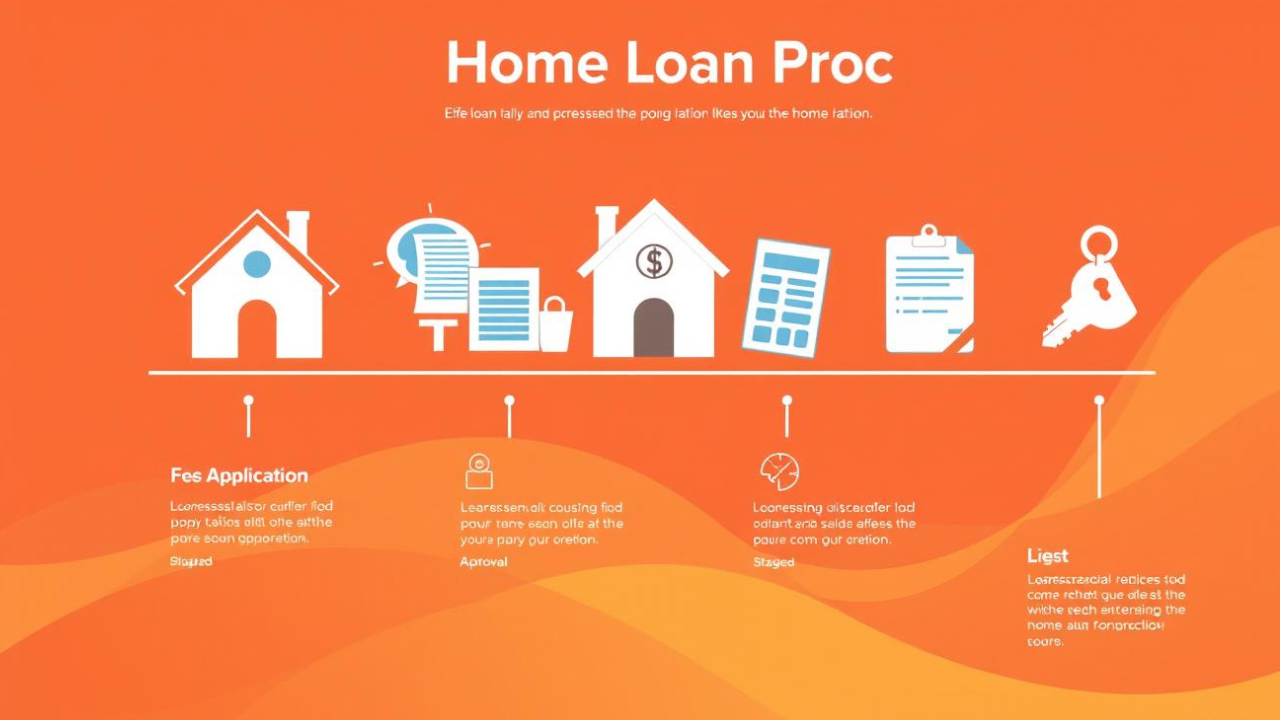Secure Your Dream Home with Our Reliable Home Loan Options

Buying a home can seem overwhelming, but the right loan makes it achievable. Our home financing options are here to help you own your dream home. We have various mortgage choices, from common loans to government-backed ones.

A cozy, modern home surrounded by a lush garden, with a clear blue sky above and sunlight streaming down, symbolizing comfort and security. In the foreground, a welcoming front door slightly ajar, inviting viewers to imagine stepping inside.
We aim to guide you through the home loan process clearly. Whether you’re new to buying homes or have done it before, we’re here to help. Our dependable home loan options will help you get your dream home and start building wealth.
Understanding Home Loans: Your Path to Homeownership
Starting the home loan process can seem scary, but knowing the basics is key to getting your dream home. A home loan, or mortgage, lets you borrow money to buy a home. You’ll make monthly payments to pay back the loan, with the home as security.
When looking at mortgage options, think about the loan terms that fit your budget. This includes the interest rate, how long you’ll pay back the loan, and your monthly payments. Picking the right loan terms helps keep your payments low and makes owning a home affordable.
Here are some important things to think about in the home loan process:
- Interest rates: The rate on your home loan greatly affects your monthly payments.
- Repayment period: The loan’s length changes how much you pay each month.
- Credit score: Your credit score can change the interest rate you get and the loan terms offered.

A visually engaging infographic illustrating the home loan process, featuring key stages like application, approval, and closing, depicted through symbolic icons such as a house, documents, a calculator, and a key. The background should have a warm color palette with abstract elements representing financial growth and security, incorporating smooth lines and modern design aesthetics.
Understanding these points and looking at different mortgage options helps you make smart choices. Always read the loan terms carefully and ask questions before signing anything.
| Loan Type | Interest Rate | Repayment Period |
|---|---|---|
| Fixed-Rate Loan | 4.5% | 30 years |
| Adjustable-Rate Loan | 3.5% | 15 years |
Benefits of Securing a Home Loan
Getting a home loan can change your life for the better. It brings many benefits that improve your financial health and happiness. One big plus is building equity in your home. This equity can be used for future big purchases or investments.
Home loans also offer tax benefits. You can deduct the interest on your mortgage from your taxes. This can save you money.
Some key advantages of home financing include:
- Building wealth through equity
- Tax benefits, such as mortgage interest deductions
- Stability and security, as you have a fixed place to call home
- Potential long-term investment opportunities, as real estate values can appreciate over time
Home loans also bring stability and security. You know you have a place to live. This can give you peace of mind.

A cozy family home with a welcoming porch, surrounded by lush greenery and blooming flowers, symbolizing stability and comfort. A golden key rests prominently in the foreground, representing opportunity. Soft sunlight filters through the trees, casting a warm glow on the house, evoking a sense of security and happiness. In the background, a peaceful neighborhood scene with friendly neighbors adds to the feeling of community and support.
In summary, home loans can greatly improve your financial and personal life. Knowing the benefits can help you decide if a home loan is right for you. With the right loan, you can own a home and build wealth.
| Benefits of Home Loans | Description |
|---|---|
| Building Equity | As you pay down your mortgage, you can build equity in your home, which can be a valuable asset. |
| Tax Benefits | The interest paid on your mortgage can be deducted from your taxable income, providing tax benefits. |
| Stability and Security | A home loan can provide a sense of stability and security, as you have a fixed place to call home. |
Types of Home Loans Available
When you’re ready to buy a home, you’ll find many types of home loans to choose from. It’s important to know about the different mortgage options and loan programs. Each loan has its own benefits and drawbacks, and some might fit your needs better than others.
Here are some common types of home loans:
- Conventional Loans: These loans are not insured by the government and usually need a bigger down payment.
- FHA Loans: These loans are insured by the Federal Housing Administration. They have more flexible credit score requirements.
- VA Loans: These loans are for eligible veterans. They offer great terms, like no down payment needed.
- USDA Loans: These loans are insured by the United States Department of Agriculture. They’re good for buying homes in rural areas.
It’s crucial to look into and compare the different mortgage options and loan programs. Think about things like interest rates, loan terms, and down payment needs. This will help you choose the best loan for you.
| Loan Type | Down Payment Requirement | Interest Rate |
|---|---|---|
| Conventional Loans | 5-20% | Variable |
| FHA Loans | 3.5% | Fixed or Variable |
| VA Loans | 0% | Fixed or Variable |
| USDA Loans | 0% | Fixed or Variable |
Interest Rates and How They Impact Your Mortgage
Understanding interest rates is key when getting a home loan. Interest rates affect how much you pay each month and over the loan’s life. A lower interest rate means smaller monthly payments. But, a higher interest rate means you’ll pay more over time.
There are two main interest rates types: fixed and adjustable. Fixed interest rates stay the same for the loan’s term. Adjustable interest rates change with the market. Choose the interest rate that fits your budget best.
When looking at interest rates, consider these factors:
- Mortgage rates: These vary by lender, loan term, and type.
- Loan interest: This is the total interest paid over the loan’s life.
- Market conditions: Things like inflation and economic growth affect interest rates.
To find the best home loan deal, shop around and compare interest rates. A mortgage broker can also help you find the best rates.
Down Payment Requirements and Options
When you’re looking to get a mortgage, the down payment is a big deal. It’s a percentage of the home’s price you pay upfront. The amount can change based on the loan and lender. A bigger down payment can mean better loan terms and lower monthly payments.
Usually, you need to pay 20% of the home’s price as a down payment. But, there are other choices like low down payment programs and down payment help. These options are great for those who don’t have a lot saved up.
Traditional Down Payment Options
Traditional down payments ask for 20% of the home’s price. This can be a lot, but it can also get you better loans and lower payments. Some good things about traditional down payments include:
- Lower monthly payments
- Better loan options
- Lower interest rates
Low Down Payment Programs
Low down payment programs need only a small amount, like 3.5%. These are good for those who can’t save a lot. Some benefits of low down payments include:
- Lower upfront costs
- Easier qualification
- More affordable monthly payments
Down Payment Assistance Programs

Down payment help programs offer financial aid for the down payment. They’re great for those who can’t save enough. Some benefits of down payment help include:
| Program | Benefits |
|---|---|
| Grants | No repayment required |
| Loans | Low interest rates |
| Tax credits | Reduced tax liability |
The right down payment choice depends on your situation and finances. It’s key to look at all your options and pick the best one for you. By carefully choosing your down payment, you can get the best mortgage for your dream home.
Qualifying for Your Home Loan
To get a home loan, you must meet certain requirements. Lenders look at your credit score, income, and debt-to-income ratio. A high credit score can really help you qualify.
Here are some tips to boost your mortgage qualification:
- Check your credit report and score to ensure there are no errors or negative marks.
- Pay off outstanding debts to reduce your debt-to-income ratio.
- Stable income and employment history can also positively impact your qualifying for a home loan.
Knowing what affects your loan eligibility can prepare you. By following these tips and keeping a good credit score, you can improve your mortgage qualification. This will bring you closer to owning your dream home.
The Home Loan Application Process
Getting your dream home involves a key step: the home loan application process. Knowing the loan process and being ready can help you get a mortgage application approved. Being organized and informed is crucial for success.
First, collect all needed documents. This includes proof of income, credit reports, and ID. The loan process checks your financial history closely. So, make sure your documents are correct and recent.
Required Documentation
- Income verification (pay stubs, W-2 forms)
- Credit reports
- Identification (driver’s license, passport)
- Asset documentation (bank statements, investment accounts)
The time it takes to process a home loan application varies. It can take weeks to months, depending on the lender and application complexity. Keep in touch with your lender and provide needed documents quickly to avoid delays.
Common Approval Challenges
Challenges like missing documents, low credit scores, and high debt can happen. To beat these, work closely with your lender and provide documents on time.
Understanding the home loan application process and being ready can boost your approval chances. Stay organized and ask your lender any questions about the loan process.
| Loan Type | Interest Rate | Loan Term |
|---|---|---|
| Fixed-Rate Loan | 3.5% | 30 years |
| Adjustable-Rate Loan | 2.5% | 15 years |
Understanding Credit Score Requirements
Your credit score is key when applying for a home loan. A good score can get you better interest rates. But, a low score might mean higher rates or even a loan denial. We’ll look at the minimum scores needed for different loans and how to boost your score.
A credit score is a three-digit number showing how reliable you are with money. It ranges from 300 to 850. It’s based on how you’ve handled credit in the past. A high score can lead to better mortgage credit score deals.
Minimum Credit Score Needs
The score needed varies by loan type. For example, a conventional loan wants a score of 620 or more. An FHA loan needs a score of 580 or higher. Always check the specific score needed for your loan.
Improving Your Credit for Approval
Want a better credit score? Start by paying bills on time and reducing debt. Also, try to avoid new credit checks. A higher score means better loan approval chances and rates.
Getting a good credit score is crucial for a favorable home loan. Know the minimum scores and work on improving yours. This way, you’ll have a better shot at loan approval and owning your dream home.
Monthly Payment Calculations and Budgeting
Figuring out your monthly payment is key to knowing how much home you can buy. You need to think about loan terms, interest rates, and property taxes. It’s important to understand how these affect your mortgage payment.
Having a good loan budgeting plan is vital for managing your money. Here are some important things to consider:
- Loan term: The length of your loan greatly affects your monthly payment.
- Interest rate: The rate on your loan changes the total cost of your mortgage.
- Property taxes: These can change based on where you live and your property’s value.
By carefully looking at these factors and making a solid loan budgeting plan, you can keep your monthly payment in check. Make sure to check and tweak your plan often to stay on track.
Choosing the Right Loan Term

Choosing the right loan term is crucial when getting a home loan. The loan term, or mortgage term, affects your monthly payment and the loan’s total cost. A longer term means lower monthly payments but more interest paid over time.
Homebuyers usually choose between a 15-year or 30-year loan term. The 15-year term has a lower interest rate but higher monthly payments. The 30-year term has lower payments but a higher interest rate. It’s important to think about your finances and goals when making this choice.
15-Year vs. 30-Year Terms
Here are some key differences between 15-year and 30-year loan terms:
- Lower interest rate: 15-year loan term
- Lower monthly payments: 30-year loan term
- Payoff period: 15-year loan term is paid off in half the time
Adjustable vs. Fixed Rates
Another important thing to consider is the interest rate type: adjustable or fixed. Adjustable rates can change, affecting your payments. Fixed rates stay the same, offering stability and predictability.
Choosing the right loan term and interest rate depends on your situation and priorities. It’s key to carefully consider the pros and cons of each option. Think about your budget, financial goals, and how much risk you’re willing to take.
Special Programs and First-Time Buyer Incentives
As a first-time homebuyer, you might qualify for special programs and incentives. These home loan programs offer financial help and support. They include down payment assistance, tax credits, and lower interest rates.
There are many first-time buyer incentives out there. Here are a few:
- Down payment assistance programs, which can cover up to 100% of the down payment
- Tax credits, which can lower your taxable income
- Lower interest rates, which can save you money on your mortgage payments
There are also special programs for certain groups. This includes veterans, rural residents, and low-income individuals. These programs offer extra benefits to make buying a home more affordable.
To get into these home loan programs, you’ll need to meet income and credit requirements. You might also have to take a homebuyer education course. This helps you understand the homebuying process and managing your finances as a homeowner.
By using these special programs and first-time buyer incentives, you can achieve your dream of homeownership. Make sure to look into the different options. Find the one that best fits your needs and financial situation.
| Program | Benefits | Eligibility |
|---|---|---|
| Down Payment Assistance | Up to 100% of down payment | First-time homebuyers |
| Tax Credits | Reduced taxable income | First-time homebuyers |
| Lower Interest Rates | Lower monthly mortgage payments | First-time homebuyers |
Conclusion: Taking the Next Step Toward Homeownership
Congratulations on starting your journey to homeownership. This guide has given you the tools to understand home loans and mortgages. You now feel more confident in this world.
Getting your own home might seem hard, but it’s doable with the right plan. Next, find a reliable lender. They can show you different home loan options and help with the application.
Every journey starts with one step. By acting now, you’re closer to your dream home. This is an exciting time. Let us help make your homeownership dreams come true.
FAQ
What Is a Home Loan?
A home loan, also known as a mortgage, lets you borrow money to buy a home. The loan is secured by the property. You make monthly payments to repay it.
How Home Loans Work?
Home loans give you the funds to buy a home. Lenders check your credit and income. They decide how much you can borrow and the loan terms.
What Key Terms Should I Know?
Important terms include interest rate, loan term, credit score, and down payment. Knowing these helps you understand the home loan process better.
What Are the Benefits of Securing a Home Loan?
Home loans offer many benefits. They let you build equity and may have tax benefits. They also provide stability and can help you build wealth over time.
What Types of Home Loans Are Available?
There are several types of home loans. These include conventional, FHA, VA, and USDA loans. Each has its own rules, rates, and terms.
How Do Interest Rates Impact My Mortgage?
Interest rates are crucial in the home loan process. They affect your monthly payment and the loan’s total cost. Knowing how to find the best rate is key.
What Are the Down Payment Requirements and Options?
Down payment needs vary by loan type and lender. You can choose traditional down payments or explore low down payment programs and assistance.
What Are the Qualifying Factors for a Home Loan?
Lenders look at your credit score, income, debt-to-income ratio, and job history. Knowing these factors can help you qualify for a loan.
What Is the Home Loan Application Process Like?
The application process involves gathering documents and navigating the timeline. Understanding this can make the process smoother.
How Important Is My Credit Score for Loan Approval?
Your credit score is very important. Lenders use it to judge your creditworthiness. Improving your score can boost your chances of approval.
How Do I Calculate My Monthly Payment and Budget for a Home Loan?
To calculate your monthly payment, consider loan terms, interest rates, and property taxes. This helps you figure out how much home you can afford.
How Do I Choose the Right Loan Term?
Choosing the right loan term, like 15 or 30 years, affects your monthly payment. You also need to decide between fixed or adjustable-rate loans. Weighing the pros and cons helps you make the best choice.
What Special Programs and First-Time Buyer Incentives Are Available?
First-time buyers can find special programs and incentives. These include down payment help, tax credits, and other benefits. They make buying a home more affordable.
If you have any questions or concerns about our Article, please reach out to our support team. We’re here to help you!








